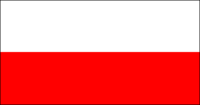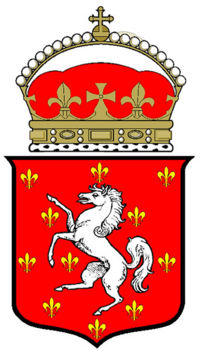Westphalia
From IBWiki
Jump to navigationJump to search| Conventional short name: | |
| Local: | Westfalen |
| English: | Westphalia |

| |
| National motto: THE MOTTO! | |
| Area: | AREA |
| Cities: | |
| Capital: | Münster |
| Largest: | Dortmund |
| Other: | OTHER CITIES |
| Currency: | 1 Reichsthaler=12 Kreuzer/Neugroschen=240 Pfennig |
| Established: | 1807, Napoleon's Decree |
| Languages: | |
| Official: | German |
| Others: | Daitsch, Limburgs, Emisc |
| Population: | POPULATION ADJECTIVE |
| RULER: | NAME |
| Organizations: | Holy Roman Empire |

| |
Westphalia has been attributed to several entities over the centuries, but today’s Westphalia is roughly the land between the Ruhr, Rhine and Weser rivers. Westphalia began as a duchy of Saxony, but was later made its own duchy by the Emperor Barbarossa in 1180, although the Duchy of Westphalia was only a small area south of the Lippe river, and drastically smaller than today’s area.
Westphalia became a kingdom in 1807, and remained so for the next six years, as a vassal state under Napoleon. Westphalia is today a largely industrial area, with mostly industrial exports.
[DH]
| |||
|---|---|---|---|
| Member Entities | |||
| Anhalt | Baden | Bavaria | Bremen | Brunswick | Hamborg | Hannover | Hesse | Lippe | Luebeck | Luxemburg | Mecklenburg | Oldenburg | Premaria | Prussia | Rhineland-Palatinate | Saarland | Saxony | Schleswig-Holstein | Thuringia | Waldeck-Pyrmont | Westphalia | Wuerttemberg | |||
| Colony: Rickerman-Insel |